Solemnity of the Most Holy
Body and Blood of Christ
(Corpus Christi)
June 6, 2021 Cycle B
White priestly vestments symbolize purity and integrity of the
life of faith.
Home Page
Liturgical
Year Cycle B 2020-2021
Introductory Acts Of Worship
The Entrance Prayers:
On Sunday, usually a hymn praising God
is sung in place of reciting a Psalm from the Bible which invites us to
enter more deeply into the mystery of God's love for us. The recited
weekday Psalm expresses a youthful heart and spirit, delighted that we may come
before the living God.
Entrance Song
/ Entrance Psalm (Antiphon)
Entrance Song
Psalm 81:17 He fed them with
the finest wheat and satisfied them with honey from the rock.
The Priest Approaches and Kisses the Altar:
The
altar is a symbol of Christ. In it are cut five crosses to recall the five
wounds of Christ. The altar also represents the Church and has embedded in
it the relics of her saints. The priest comes to the altar to celebrate
the Sacrifice in the Church's name. Because of the glory surrounding the
altar upon which the divine Sacrifice will be made, the kiss of the priest
unites the Church to Christ, its Redeemer.
Priest:
In the name of the Father, and of the Son, and of the Holy Spirit.
All:
Amen.
Priest: The Lord be with you.
All: And
with your spirit.
The Penitential Prayers:
We recognize our guilt for past sins,
express our sorrow for them, and ask that Mary, the angels, the saints, and our
brothers and sisters in Christ pray for the Lord God's mercy. (The priest
may select from several forms).
Priest: Brothers and sisters, let
us acknowledge our sins, and so prepare ourselves to celebrate the sacred
mysteries.
Priest: You were sent to heal the contrite of heart: Lord, have
mercy.
All: Lord, have mercy.
Priest: You came to call sinners: Christ, have mercy.
All: Christ, have mercy.
Priest: You are seated at the right hand of the Father to intercede
for us: Lord, have mercy.
All: Lord, have mercy.
The Absolution:
Priest: May almighty God have
mercy on us, forgive us our sins, and bring us to everlasting life.
All:
Amen.
The Gloria:
The Glory of God prayers have existed from
the second century. They repeat the angels praise of God which heralded
the birth of Christ on earth. Our praise is lifted again through the years
as we rejoice at His coming as Lord, God, the most high Jesus Christ, who at
Christmas took on our human nature while at the same time being the son of Man.
This ancient hymn expresses our recognition of God's glory and love. It
calls upon Christ as our holy and divine mediator, and the Holy Spirit who
forever binds us together in God's love.
Priest and All:
Glory to God in the highest, and peace to his people
on earth. Lord God, heavenly King, almighty God and Father, we worship
you, we give you thanks, we praise you for your glory. Lord Jesus Christ,
only Son of the Father, Lord God, Lamb of God, you take away the sins of the
world: have mercy on us; you are seated at the right hand of the Father: receive
our prayer. For you alone are the Holy One, you alone are the Lord, you
alone are the Most High, Jesus Christ, with the Holy Spirit, in the glory of God
the Father. Amen.
The Collect:
The
priest lifts the united prayers and petitions of the congregation to God the
Father through the merits of Jesus Christ in the Holy Spirit.
Priest: Let us pray.
Priest: O God, who in this wonderful Sacrament have left us a
memorial of your Passion, grant us, we pray, so to revere the sacred mysteries
of your Body and Blood that we may always experience in ourselves the fruits of
your redemption. Who live and reign with God the Father in the unity of
the Holy Spirit, one God, for ever and ever.
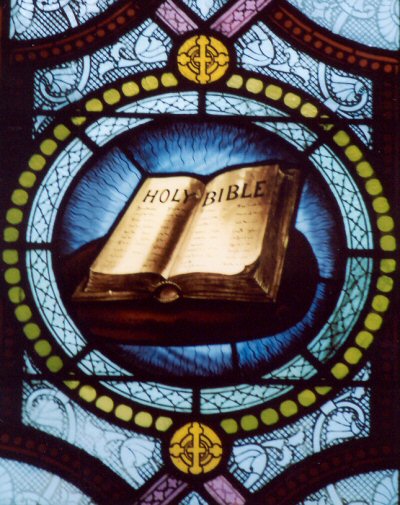 Liturgy
of the Word
Liturgy
of the Word
Christ is made known to us through the
Old Testament which prepares us to recognize Him. In those days, God
inspired men who spoke His message. Now, the New Testament Gospel reading
announces His presence to us directly through His Son. Both
readings bring God's message to us. Our responsibility is to respond.
The First Reading:
From the Old Testament.
Exodus 24:3-8
When Moses came to the
people and related all the words and ordinances of the Lord, they all answered
with one voice, "We will do everything that the Lord has told us." Moses
then wrote down all the words of the Lord and rising early the next day, he
erected at the foot of the mountain an altar and twelve pillars for the twelve
tribes of Israel. Then, having sent certain young men of the Israelites to
offer holocausts and sacrifice young bulls as peace offerings to the Lord, Moses
took half of the blood and put it in large bowels; the other half he splashed on
the altar. Taking the book of the covenant, he read it aloud to the
people, who answered, "All that the Lord has said, we will heed and do."
Then he took the blood and sprinkled it on the people, saying, "This is the
blood of the covenant that the Lord has made with you in accordance with all
these words of his."
Priest/Reader:
The Word of the
Lord.
All:
Thanks
be to God.
The Responsorial Psalm:
This Psalm praising God, is a prayer to God,
or recommends the practice of virtue. It is sung as an interlude between
the scriptural readings. It provides yet another instructional setting and
invites the assembly to imitate the cantor who sings a repeated response to the
verses of an ancient Psalm many of which are attributed to King David. The
verses are sung first by a cantor (song leader) accompanied by instruments, the
refrain is sung by the people.
Responsorial
Psalm 116:12-13, 15-16, 17-18
Cantor: I will take the cup of
salvation, and call upon the name of the Lord.
All: R/. I will
take the cup of salvation, and call upon the name of the Lord.
Cantor: How shall I make a return to the Lord for all the
good he has done for me? The cup of salvation I will take up, and I will call
upon the name of the Lord.
All: R/. I
will take the cup of salvation, and call upon the name of the Lord.
Cantor: Precious in the eyes of the Lord is the death of his
faithful ones. I am your servant, the son of your handmaid: you have loosed my
bonds.
All: R/. I
will take the cup of salvation, and call upon the name of the Lord.
Cantor: To you will I offer a sacrifice of thanksgiving, and
I will call upon the name of the Lord. My vows to the Lord I will pay in the
presence of all his people.
All: R/. I
will take the cup of salvation, and call upon the name of the Lord.
The Second Reading:
Taken from the New Testament,
from a letter written by St. Paul.
Letter to the Hebrews 9:11-15
Brothers and sisters:
When Christ came as high priest of the good things that have come to be, passing
through the greater and more perfect tabernacle not made by hands, that is, not
belonging to this creation, he entered once for all into the sanctuary, not with
the blood of goats and calves but with his own blood, thus obtaining eternal
redemption. For if the blood of goats and bulls and the sprinkling of a
heifer’s ashes can sanctify those who are defiled so that their flesh is
cleansed, how much more will the blood of Christ, who through the eternal Spirit
offered himself unblemished to God, cleanse of consciences from dead works to
worship the living God.
For this reason he is mediator of a new
covenant: since a death has taken place for deliverance from transgressions
under the first covenant, those who are called may receive the promised eternal
inheritance.
The Sequence: Lauda Sion
- A sort of hymn but in no regular
meter. Sequences originated in the 10th century and became very popular in
the Middle Ages.
Lauda Sion is one of five remaining in the Roman Missal; all
of which are sung at certain Mass throughout the Church Year.
Laud, O Zion, your salvation, Laud with hymns
of exultation, Christ, your king and shepherd true: bring him all the praise you
know, He is more than you bestow. Never can you reach his due.
Special theme for glad
thanksgiving is the quick’ning and the living bread today before you set: from
his hands of old partaken, as we know, by faith unshaken, where the Twelve at
supper met.
Full and clear ring out
your chanting, joy nor sweetest grace be wanting, from your heart let praises
burst: for today the feast is holden, when the institution olden of that supper
was rehearsed.
Here the new law’s new
oblation, by the new king’s revelation, ends the form of ancient rite: now the
new the old effaces, truth away the shadow chases, light dispels the gloom of
night.
What He did at supper
seated, Christ ordained to be repeated, His memorial ne’er to cease: and His
rule for guidance taking, bread and wine we hallow, making thus our sacrifice of
peace.
This the truth each
Christian learns, bread into his flesh he turns, to his precious blood the wine:
sight has failed nor thought conceives, but a dauntless faith believes, resting
on a power divine.
Here beneath these signs
are hidden priceless things to sense forbidden; signs, not thing are all we see:
blood is poured and flesh is broken, yet in either wondrous token Christ entire
we know to be.
Whoso of this food
partakes, does not rend the Lord nor breaks; Christ is whole to all that taste:
thousands are, as one, receivers, one, as thousands of believers, eats of him
who cannot waste.
Bad and good the feast are
sharing, of what divers dooms preparing, endless death, or endless life. Life
to these, to those damnation, see how like participation is with unlike issues
rife.
When the sacrament is
broken, doubt not, but believe ‘tis spoken, that each severed outward token doth
the very whole contain. Nought the precious gift divides, breading but the sign
betides Jesus still the same abides, still unbroken does remain.
Lo! The angel’s food is
given to the pilgrim who has striven; see the children’s bread from heaven,
which on dogs may not be spent.
Truth the ancient types
fulfilling, Isaac bound, a victim willing, Paschal lamb, its lifeblood spilling,
manna to the fathers sent.
Very bread, good shepherd,
tend us, Jesus, of your love befriend us, you refresh us, you defend us, your
eternal goodness send us in the land of life to see.
You who all things can and
know, who on earth such food bestow, grant us with your saints, though lowest,
where the heavenly feast you show, fellow heirs and guests to be.
Amen. Alleluia.
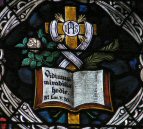 The Gospel:
The Liturgy of the Word is completed
by the reading of the Gospel. Before its reading, the members of the
assembly trace the sign of the cross upon the forehead to indicate their mental
acceptance of the Truth, on the lips to indicate their readiness to announce it,
and over the heart to indicate their sincere desire to accept it into their
lives. The "Good News" of the Gospel tells that God's kingdom has come for
all to hear, accept, and announce to the world for its salvation. It
is God who is speaking to us. Christ comes to teach us by the example of
His life and by His own words.
The Gospel:
The Liturgy of the Word is completed
by the reading of the Gospel. Before its reading, the members of the
assembly trace the sign of the cross upon the forehead to indicate their mental
acceptance of the Truth, on the lips to indicate their readiness to announce it,
and over the heart to indicate their sincere desire to accept it into their
lives. The "Good News" of the Gospel tells that God's kingdom has come for
all to hear, accept, and announce to the world for its salvation. It
is God who is speaking to us. Christ comes to teach us by the example of
His life and by His own words.
Priest: Cleanse my heart and my lips, almighty God, that I may worthily proclaim your
holy Gospel. Through the words of the Gospel may our sins be wiped away.
Priest: The Lord be with you.
All: And with our spirit.
Priest/Deacon: A
reading from the holy Gospel according
to John.
All: Glory
to you, Lord.
The Gospel: Mark 14:12-16, 22-26
Mark wrote to explain Christ
to the new Gentile converts.
 On
the first day of the Feast of Unleavened Bread, when they sacrificed the
Passover lamb, Jesus' disciples said to him, "Where do you want us to go and
prepare for you to eat the Passover?" He sent two of his disciples and
said to them, "Go into the city and a man will meet you carrying a jar of water.
Follow him. wherever he enters, say to the master of the house, 'The
Teacher says, "Where is my guest room where I may eat the Passover with my
disciples?'" Then he will show you a large upper room furnished and ready.
Make the preparations for us there." The disciples then went off, entered
the city, and found it just as he had told them; and they prepared the Passover.
On
the first day of the Feast of Unleavened Bread, when they sacrificed the
Passover lamb, Jesus' disciples said to him, "Where do you want us to go and
prepare for you to eat the Passover?" He sent two of his disciples and
said to them, "Go into the city and a man will meet you carrying a jar of water.
Follow him. wherever he enters, say to the master of the house, 'The
Teacher says, "Where is my guest room where I may eat the Passover with my
disciples?'" Then he will show you a large upper room furnished and ready.
Make the preparations for us there." The disciples then went off, entered
the city, and found it just as he had told them; and they prepared the Passover.
While
they were eating, he took bread, said the blessing, broke it, gave it to them,
and said, "Take it; this is my body." Then he took a cup, gave thanks, and
gave it to them, and they all drank from it. He said to them, "This is my
blood of the the covenant, which will be shed for many. Amen, I say
to you, I shall not drink again the fruit of the vine until the day when I drink
it new in the kingdom of God." Then, after singing a hymn, they went out
to the Mount of Olives.
Priest: The
Gospel of the Lord.
All: Praise to you, Lord Jesus Christ.
Priest: Through the words of the Gospel may our sins be wiped
away.
The Priest's Sermon:
The priest develops, explains, and comments upon the Master's words,
so our minds may be
enlightened, and our
hearts enriched.
(A priestly reflection upon this Gospel)
Profession of Faith:
We state in the
Nicene Creed the principles of our faith in precise and definite terms.
All: I believe in one God, the Father, the Almighty,
maker of heaven and earth, of all that is seen and unseen. I believe in
one Lord, Jesus Christ, the Only Begotten Son of God, born of the Father before
all ages.
God from God, Light from Light, true God from true God, begotten, not made,
consubstantial with the Father; through him all things were made. For us
men and for our salvation he came down from heaven, and by the Holy
Spirit was incarnate of the Virgin Mary, and became man. For our sake he was
crucified under Pontius Pilate, he suffered death and was buried, and rose again
on the third day in accordance with the Scriptures. He ascended into
heaven and is seated at the right hand of the Father. He will come again
in glory to judge the living and the dead and his kingdom will have no end.
I believe in the Holy Spirit, the Lord, the giver of life, who proceeds from
the Father and the Son, who with the Father and the Son is adored and
glorified, who has spoken through the prophets. I believe in one,
holy, catholic and apostolic Church. I confess one Baptism for the
forgiveness of sins and I look for the resurrection of the dead and the
life of the world to come. Amen.
General Intercessions:
We pray for the needs of the pope, civic
leaders, our own needs, those of others,
the sick, the dying, those who have died, the church, and the world.
The response of all to each intercession: Lord, hear our prayer.
All: Lord,
hear our prayer.
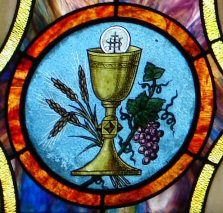 The Liturgy of the Eucharist
The Liturgy of the Eucharist
Gifts of bread and wine
symbolizing ourselves are presented to the priest who will offer them to God the
Father. Through the Holy Spirit, they will become the Body and Blood of
Jesus Christ whom we receive in Holy Communion. Jesus unites Himself with
us for our spiritual nourishment and strength. Today, when individuals do
not present their own personal offerings of bread and wine, the monetary contribution
symbolizes the material of their united sacrifice. The priest makes and
offering of the bread and wine to God.
Preparation of the Bread and
Wine:
Priest: Blessed are you, Lord God of all creation,
for through your goodness we have received the bread we offer you:
fruit of the earth and work of human hands, it will become for us the bread of
life.
All:
Blessed be God for ever.
Priest: By
the mystery of this water and wine may we come to share in the divinity of
Christ, who humbled himself to share
in our humanity.
Priest: Blessed are you, Lord God of all creation, for through your goodness we have
received the wine we offer you; fruit of the vine and work of human hands it will become our spiritual drink.
All: Blessed be God for ever.
Priest: With
humble spirit and contrite heart may we be accepted by you, O Lord, and may our
sacrifice in your sight this
day be pleasing to you, Lord God.
The Priest's Hands are Washed: This
act was traditionally necessary because the priest handled the various gifts
presented by the people. Now, the cleansing act using water reminds the
priest and ourselves of the need to cleanse not only the hands but the soul.
Soon, the priest's hands will hold the actual body of Christ, and we will become
His dwelling place.
Priest: Wash
me O Lord, from my iniquity and cleanse me from my sin.
Pray, brethren, that
my sacrifice and yours may be acceptable to God, the almighty Father.
All: May the Lord accept the sacrifice at your hands for the praise and glory of his
name, for our good and the good of all his holy Church.
Prayer over the Gifts:
Speaking in our name, the priest asks
the Father to accept the gifts we offer through him.
Priest: Grant
your Church, O Lord, we pray, the gifts of unity and peace, whose signs are to
be seen in mystery in the offerings we here present. Through Christ our
Lord.
Eucharistic Prayer:
(Number One: The priest may select from several forms).
Priest: The Lord be with you.
All: And with your
spirit.
Priest: Lift up your hearts.
All: We lift them up to the Lord.
Priest: Let us give thanks to the Lord, our God.
All: It is right
and just.
Preface Prayer:
Priest: It
is truly right and just, our duty and our salvation, always and everywhere to
give you thanks, Lord, holy Father, almighty and eternal God through Christ our
Lord.
For at the Last supper with his Apostles,
establishing for the ages to come the saving memorial of the Cross, he offered
himself to you as the unblemished Lamb, the acceptable gift of perfect praise.
Nourishing your faithful by this sacred mystery, you make them holy, so that the
human race, bounded by one world, may be enlightened by one faith and united by
one bond of charity. And so, we approach the table of this wondrous
Sacrament, so that, bathed in the sweetness of your grace, we may pass over to
the heavenly realities here foreshadowed. Therefore, all creatures of
heaven and earth sing a new song in adoration, and we, with all the host of
Angels, cry out, and without end we acclaim:
Acclamation:
Priest
and All:
Holy, Holy, Holy Lord, God of power and
might, Heaven and earth are full of your glory. Hosanna in the highest.
Blessed is he who comes in the name of the Lord. Hosanna in the highest.
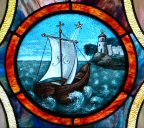 Priest: To
you, therefore, most merciful Father, we make humble prayer and petition through
Jesus Christ, your Son, our Lord: that you accept and bless these gifts, these
offerings, these holy and unblemished sacrifices, which we offer you firstly for
your holy catholic church. Be pleased to grant her peace, to guard, unite
and govern her throughout the whole world, together with your servant ______,
our Pope and _____, our Bishop, and all those who, holding to the truth, hand on
the catholic and apostolic faith.
Priest: To
you, therefore, most merciful Father, we make humble prayer and petition through
Jesus Christ, your Son, our Lord: that you accept and bless these gifts, these
offerings, these holy and unblemished sacrifices, which we offer you firstly for
your holy catholic church. Be pleased to grant her peace, to guard, unite
and govern her throughout the whole world, together with your servant ______,
our Pope and _____, our Bishop, and all those who, holding to the truth, hand on
the catholic and apostolic faith.
Remember, Lord, your servants _____ and _____
and all gathered here, whose faith and devotion are known to you. For
them, we offer you this sacrifice of praise or they offer it for themselves and
all who are dear to them: for the redemption of their souls, in hope of health
and well-being, and paying their homage to you, the eternal God, living and
true.
In communion with those whose memory we
venerate, especially the glorious ever-Virgin Mary, Mother of our God and Lord,
Jesus Christ, and blessed Joseph, her Spouse, your blessed Apostles and Martyrs,
Peter and Paul, Andrew, James, John, Thomas, James, Philip, Bartholomew,
Matthew, Simon and Jude; Linus, Cletus, Clement, Sixtus, Cornelius, Cyprian,
Lawrence, Chrysogonus, John and Paul, Cosmas and Damian and all your Saints; we
ask that through their merits and prayers, in all things we may be defended by
your protecting help. Through Christ our Lord. Amen.
Be pleased, O God, we pray, to bless,
acknowledge, and approve this offering in every respect; make it spiritual and
acceptable, so that it may become for us the Body and Blood of your most beloved
Son, our Lord Jesus Christ.
The priest repeats the words which
Christ used at his Last Supper when He changed the bread into His Body and the
wine into His Blood. His Body and Blood are truly present but under the
appearance of bread and wine. The death of Christ is prolonged in each of those who receive Him worthily. We apply His
death to ourselves so that we may share His glory. This moment is the most solemn on earth because it is Divine act which enables
us to apply to ourselves the Cross which Christ willingly took upon Himself.
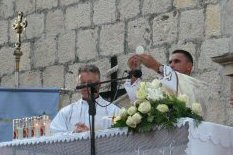 We are called to die to sin and lift our very selves to
God so that we become changed; to do as God would have us do, to become what
God would have us become. Our own little cross can lift us into union with
Christ's Cross so we may earn the joys of everlasting happiness with God the
Father.
We are called to die to sin and lift our very selves to
God so that we become changed; to do as God would have us do, to become what
God would have us become. Our own little cross can lift us into union with
Christ's Cross so we may earn the joys of everlasting happiness with God the
Father.
The
Lord's Supper:
The day before he suffered he took
bread in his sacred hands and looking up to heaven, to you, his almighty Father,
he gave you thanks and praise. He broke the bread, gave it to his
disciples, and said:
Take this, all of
you and eat of it: for this is my Body which will be given up for you.
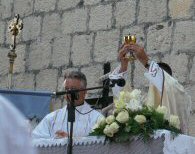 In a similar
way, when
supper was ended, he took this precious chalice in his holy and venerable hands,
and once more giving you thanks, he said the blessing and gave the chalice to
his disciples, saying:
In a similar
way, when
supper was ended, he took this precious chalice in his holy and venerable hands,
and once more giving you thanks, he said the blessing and gave the chalice to
his disciples, saying:
Take this, all of you, and drink from it; for this is the chalice of my
Blood, the Blood of the new and eternal covenant; which will be poured out for you and for many for the
forgiveness of sins. Do this in memory of me.
The Mystery of Faith:
Priest: Let us proclaim the mystery of faith:
Priest
and All: Save us,
Savior of the world, for by your Cross and Resurrection you have set us free.
Memorial Prayer:
Priest: Therefore, O Lord, as we celebrate the memorial of the
blessed Passion, the Resurrection from the dead, and the glorious Ascension into
heaven of Christ, your Son, our Lord, we, your servants and your holy people,
offer to your glorious majesty from the gifts that you have given us, this pure
victim, this holy victim, this spotless victim, the holy Bread of eternal life
and the Chalice of everlasting salvation.
Be pleased to look upon these offerings with
a serene and kindly countenance, and to accept them, as once you were pleased to
accept the gifts of your servant Abel the just, the sacrifice of Abraham, our
father in faith, and the offering of your high priest Melchizedek, a holy
sacrifice, a spotless victim.
In humble prayer we ask you, almighty God:
command that these gifts be borne by the hands of your holy Angel to your altar
on high in the sight of your divine majesty, so that all of us, who through this
participation at the altar receive the most holy Body and Blood of your Son, may
be filled with every grace and heavenly blessing. Through Christ our Lord.
Amen.
Remember also, Lord, your servants _____ and
_____, who have gone before us with the sing of faith and rest in the sleep of
peace. Grant them, O Lord, we pray, and all who
sleep in Christ, a place of refreshment, light and peace. Through Christ
our Lord. Amen.
To us, also, your servants, who, though sinners,
hope in your abundant mercies, graciously grant some share and fellowship with
your holy Apostles and martyrs: with John the Baptist, Stephen, Matthias,
Barnabas, (Ignatius, Alexander, Marcellinus, Peter, Felicity, Perpetua, Agatha,
Lucy, Agnes, Cecilia, Anastasia) and all your Saints; admit us, we beseech you,
into their company not weighing our merits, but granting us your pardon, through
Christ our Lord.
Through whom you continue to make all these good
things, O Lord; you sanctify them, fill them with life, bless them, and bestow
them upon us.
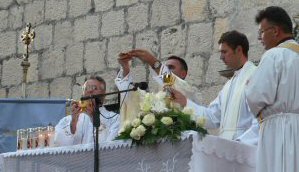 Doxology:
Doxology:
Prayer of Praise: Through him, with him,
and in him, in the unity of the Holy Spirit, all glory and honor is yours,
almighty Father, for ever and ever. Amen.
Communion Rite
In the Liturgy of the Eucharist, we
symbolically offer ourselves to the Lord through the gifts of bread and wine.
At the Consecration, we offer our very lives to be united the God the Father
through the Cross of Christ. In Communion, we find that we have not died
at all, but have come to life. We have surrendered ourselves to God
through His Divine Son, Jesus Christ. In return become ennobled and
enriched. We give up time and we get eternity, we give up our sin and we
receive grace, we surrender our self-will and receive the strength of the Divine
Will, we give up ourselves and we receive everything. For the Son of God
says to us that unless we receive Him we shall not have Divine life in us.
But it is not really we who receive Christ as it is Christ who receives us,
bringing us into Himself.
God makes His Cross the very means
of our salvation and our life. While we have crucified Him, His eternal
love cannot be extinguished. Christ willed to give us the very life we
crucified in our Redemption, the Consecration of Holy Thursday into Communion,
His death into our everlasting life.
The Lord's
Prayer:
Priest:
Let us ask our Father to forgive our sins and to bring us to forgive those
who sin against us.
Priest and
All: Our
Father, who art in heaven, hallowed be they name; Thy kingdom come; Thy will be
done on earth as it is in
heaven. Give us this
day our daily bread; and forgive us our trespasses as we forgive those who
trespass against us; and lead us not into temptation, but deliver us from evil.
Priest: Deliver us, Lord, we pray, from every evil,
graciously grant peace in our days, that, by the help of your mercy, we may be
always free from sin and safe from all distress, as we await the
blessed hope and the coming of our Savior, Jesus Christ.
All: For the kingdom, the power,
and the glory are yours, now and for ever.
Prayer for
Peace:
Priest: Lord
Jesus Christ, you said to your apostles: I leave you peace, my peace I give you.
Look not on our sins, but on the faith
of your Church, and grant us peace and unity of your kingdom where you live for
ever and ever. Amen.
Priest: Let
us offer each other the sign of peace.
Breaking of the Bread:
Priest and All: Lamb of God, you take away the sins of the
world, have mercy on us.
Lamb of God, you take away the sins of the world, have mercy on us.
Lamb of God, you take away the sins of the world, grant us peace.
Priest: May this mingling of the body and blood of our Lord
Jesus Christ bring eternal life to us who receive it.
Communion of the Priest:
Priestly Preparation: May
the receiving of your Body and Blood, Lord Jesus Christ, not bring me to
judgment and
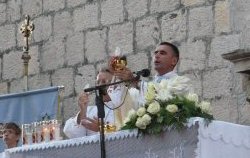 condemnation, but through your loving mercy be for me protection in
mind and body and a healing remedy.
condemnation, but through your loving mercy be for me protection in
mind and body and a healing remedy.
Priest: Behold, the Lamb of
God, behold him who takes away the sins of the world. Blessed are those
who are called to the supper of the Lamb.
Priest and All: Lord,
I am not worthy to receive you, but only say the word and I shall be healed.
Priest: May the Body of Christ keep me safe for eternal life.
May the Blood of Christ keep me safe for eternal life.
Communion Antiphon:
John 6:57
Priest: Whoever eats my flesh and drinks my blood remains in me
and I in him, says the Lord.
Communion of the Faithful:
Priest: The Body of Christ.
The Faithful: Amen.
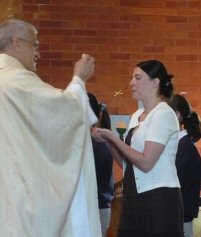
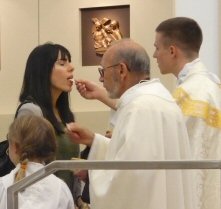
Priest/Deacon/
Extraordinary Eucharistic Minister:
The Blood of Christ.
The Faithful: Amen.
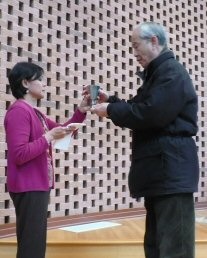
Cleansing of the Vessels:
Priest: Lord,
may I receive these gifts in purity of heart. May they bring me healing
and strength, now and for ever.
Prayer after Communion:
Priest: Let us pray.
Priest: Grant, O Lord, we pray, that we may delight for all eternity
in that share in your divine life, which is foreshadowed in the present age by
our reception of your precious Body and Blood. Who live and reign for ever
and ever.
Procession with the Blessed Sacrament:
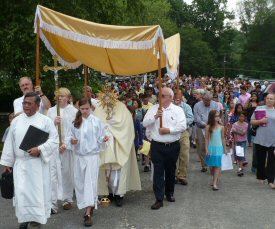
O my Jesus, forgive us our sins.
Save us from the fires of hell.
Lead all souls to heaven,
especially those in most need of your mercy.
www.Divinemasterplanforlife.com
www.Saintsnheaven.com
Home Page
Liturgical
Year Cycle B 2020-2021
 Liturgy
of the Word
Liturgy
of the Word The Gospel:
The Liturgy of the Word is completed
by the reading of the Gospel. Before its reading, the members of the
assembly trace the sign of the cross upon the forehead to indicate their mental
acceptance of the Truth, on the lips to indicate their readiness to announce it,
and over the heart to indicate their sincere desire to accept it into their
lives. The "Good News" of the Gospel tells that God's kingdom has come for
all to hear, accept, and announce to the world for its salvation. It
is God who is speaking to us. Christ comes to teach us by the example of
His life and by His own words.
The Gospel:
The Liturgy of the Word is completed
by the reading of the Gospel. Before its reading, the members of the
assembly trace the sign of the cross upon the forehead to indicate their mental
acceptance of the Truth, on the lips to indicate their readiness to announce it,
and over the heart to indicate their sincere desire to accept it into their
lives. The "Good News" of the Gospel tells that God's kingdom has come for
all to hear, accept, and announce to the world for its salvation. It
is God who is speaking to us. Christ comes to teach us by the example of
His life and by His own words. On
the first day of the Feast of Unleavened Bread, when they sacrificed the
Passover lamb, Jesus' disciples said to him, "Where do you want us to go and
prepare for you to eat the Passover?" He sent two of his disciples and
said to them, "Go into the city and a man will meet you carrying a jar of water.
Follow him. wherever he enters, say to the master of the house, 'The
Teacher says, "Where is my guest room where I may eat the Passover with my
disciples?'" Then he will show you a large upper room furnished and ready.
Make the preparations for us there." The disciples then went off, entered
the city, and found it just as he had told them; and they prepared the Passover.
On
the first day of the Feast of Unleavened Bread, when they sacrificed the
Passover lamb, Jesus' disciples said to him, "Where do you want us to go and
prepare for you to eat the Passover?" He sent two of his disciples and
said to them, "Go into the city and a man will meet you carrying a jar of water.
Follow him. wherever he enters, say to the master of the house, 'The
Teacher says, "Where is my guest room where I may eat the Passover with my
disciples?'" Then he will show you a large upper room furnished and ready.
Make the preparations for us there." The disciples then went off, entered
the city, and found it just as he had told them; and they prepared the Passover. The Liturgy of the Eucharist
The Liturgy of the Eucharist Priest: To
you, therefore, most merciful Father, we make humble prayer and petition through
Jesus Christ, your Son, our Lord: that you accept and bless these gifts, these
offerings, these holy and unblemished sacrifices, which we offer you firstly for
your holy catholic church. Be pleased to grant her peace, to guard, unite
and govern her throughout the whole world, together with your servant ______,
our Pope and _____, our Bishop, and all those who, holding to the truth, hand on
the catholic and apostolic faith.
Priest: To
you, therefore, most merciful Father, we make humble prayer and petition through
Jesus Christ, your Son, our Lord: that you accept and bless these gifts, these
offerings, these holy and unblemished sacrifices, which we offer you firstly for
your holy catholic church. Be pleased to grant her peace, to guard, unite
and govern her throughout the whole world, together with your servant ______,
our Pope and _____, our Bishop, and all those who, holding to the truth, hand on
the catholic and apostolic faith.
 We are called to die to sin and lift our very selves to
God so that we become changed; to do as God would have us do, to become what
God would have us become. Our own little cross can lift us into union with
Christ's Cross so we may earn the joys of everlasting happiness with God the
Father.
We are called to die to sin and lift our very selves to
God so that we become changed; to do as God would have us do, to become what
God would have us become. Our own little cross can lift us into union with
Christ's Cross so we may earn the joys of everlasting happiness with God the
Father.
 In a similar
way, when
supper was ended, he took this precious chalice in his holy and venerable hands,
and once more giving you thanks, he said the blessing and gave the chalice to
his disciples, saying:
In a similar
way, when
supper was ended, he took this precious chalice in his holy and venerable hands,
and once more giving you thanks, he said the blessing and gave the chalice to
his disciples, saying:  Doxology:
Doxology:  condemnation, but through your loving mercy be for me protection in
mind and body and a healing remedy.
condemnation, but through your loving mercy be for me protection in
mind and body and a healing remedy. 


